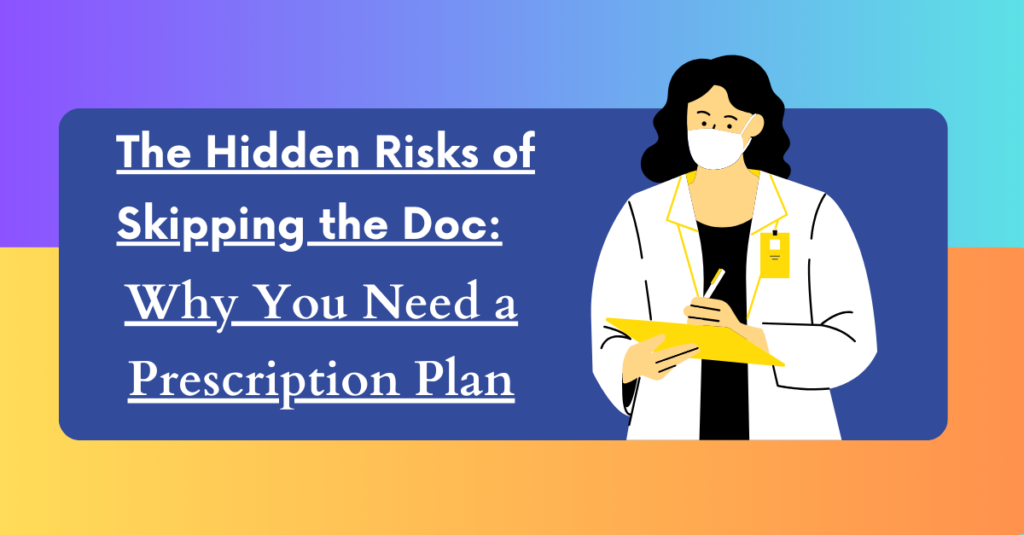The Hidden Risks of Skipping the Doc: Why You Need a Prescription Plan
Introduction
In our fast-paced, instant-gratification-oriented world, the idea of scheduling a doctor’s appointment can sometimes be met with resistance or seen as an unnecessary inconvenience. Many individuals are lured by the promise of quick solutions to health concerns, often turning to self-diagnosis through the vast amount of health-related information available online or seeking remedies from over-the-counter medications. However, what may appear to be a convenient shortcut to resolving health issues can conceal a host of hidden risks. In this article, we will explore the critical importance of consulting a doctor before obtaining a prescription and why having a well-structured prescription plan is an indispensable component of responsible healthcare.
The Hidden Risks of Skipping the Doc: Why You Need a Prescription Plan
The Convenience Paradox
In an age where we can order groceries with a click of a button and have them delivered within hours, the convenience of modern life can lead us to seek quick fixes for all aspects of our lives, including our health. The proliferation of information on the internet has made it easier than ever to self-diagnose health issues. Online forums, medical websites, and symptom checkers offer a wealth of information, allowing individuals to piece together potential diagnoses and treatment plans from the comfort of their homes. In addition, over-the-counter medications are readily available at local pharmacies and stores, allowing consumers to purchase remedies without a prescription.
While these conveniences have their merits, they can also create a dangerous illusion of self-sufficiency when it comes to healthcare. The hidden risks of skipping the doctor’s consultation are manifold and can have far-reaching consequences.
The Role of Prescription Medications
Before delving into the hidden risks of bypassing a doctor’s visit, it’s essential to understand the significance of prescription medications in healthcare. Prescription drugs are medications that require a written order, or prescription, from a licensed healthcare provider, typically a physician, nurse practitioner, or dentist, to be dispensed by a pharmacist. These medications are subject to more stringent regulations and oversight than over-the-counter drugs, primarily because they often possess a higher potential for side effects or misuse.
Prescription medications play a pivotal role in the management and treatment of various medical conditions. They are formulated to address specific health issues and are tailored to an individual’s unique medical history, current health status, and potential interactions with other medications they may be taking. By their very nature, prescription medications demand careful consideration and expert guidance.
The Hidden Risks of Skipping the Doctor
Now, let’s delve into the hidden risks associated with skipping a doctor’s consultation and obtaining prescription medications without professional guidance:
1. Incorrect Self-Diagnosis:
- The Dangers of Dr. Google: The internet is a vast repository of medical information, but it’s also a breeding ground for misinformation. Self-diagnosis based on internet research can lead to inaccuracies, as it often lacks the context, expertise, and diagnostic tools that healthcare professionals possess.
- Misidentifying the Issue: Even with accurate information, it’s easy to misinterpret symptoms or mistake one condition for another. This can result in choosing the wrong medication, leading to ineffective treatment or potentially exacerbating the underlying issue.
2. Inappropriate Treatment:
- One Size Does Not Fit All: Over-the-counter medications are designed for a broad spectrum of consumers and may not be suitable for specific individuals, especially those with underlying health conditions or taking other medications.
- Ignoring Underlying Causes: Self-medication can sometimes mask symptoms without addressing the root cause of the health issue, potentially allowing it to progress unchecked.
3. Dangerous Drug Interactions:
- A Complex Web of Medications: Individuals often take multiple medications or supplements simultaneously. Without a doctor’s oversight, there’s a risk of dangerous drug interactions that could lead to adverse effects or even life-threatening situations.
4. Delayed Diagnosis of Serious Conditions:
- Missing the Bigger Picture: Some health conditions present with seemingly mild symptoms initially. Relying solely on self-diagnosis and self-medication may delay the identification of serious underlying conditions, such as cancer or chronic diseases.
5. Incorrect Dosage:
- Trial and Error: Without a doctor’s guidance, individuals may resort to trial and error to find the right dosage, potentially leading to overdose or underuse of medications.
6. Lack of Monitoring:
- No Professional Oversight: Doctors play a crucial role in monitoring the progress of treatment. When individuals skip consulting a doctor, there is no professional oversight to assess the effectiveness of the medication or make necessary adjustments.
Legal and Ethical Considerations
Beyond the medical risks, there are also legal and ethical aspects to obtaining prescription medications:
1. Legal Requirement for Prescription Medications:
- Regulatory Measures: Many countries have regulations in place that classify certain medications as prescription-only due to their potential risks, side effects, or the need for proper monitoring. Obtaining these drugs without a valid prescription can lead to legal consequences.
2. Ethical Considerations in Medical Practice:
- Patient Welfare: Healthcare providers are bound by ethical guidelines that prioritize patient safety and well-being. Seeking a doctor’s advice ensures that your healthcare decisions align with these ethical principles.
3. Consequences of Obtaining Prescription Drugs Without Consultation:
- Legal Penalties: Attempting to acquire prescription medications without a doctor’s prescription can result in legal penalties, including fines or even imprisonment.
- Healthcare Access: Misusing prescription medications can strain healthcare resources and limit access to necessary medications for those who genuinely need them.
Prescription Plan: The Way Forward
Given the hidden risks of skipping the doctor’s consultation, it’s evident that a well-structured prescription plan is essential for responsible healthcare. Such a plan involves the following components:
1. Professional Medical Consultation:
- Expert Diagnosis: A doctor’s visit ensures an accurate diagnosis based on medical knowledge, clinical evaluation, and diagnostic tests.
- Personalized Treatment: Doctors tailor treatment plans to an individual’s unique needs, taking into account medical history, current health status, and potential drug interactions.
2. Legal Compliance:
- Prescription Medications: Complying with legal requirements ensures that you obtain prescription medications through legitimate channels, reducing the risk of legal consequences.
3. Ethical Practice:
- Ethical Healthcare: Seeking a doctor’s advice aligns with ethical principles that prioritize patient welfare and responsible healthcare practices.
4. Monitoring and Adjustments:
- Treatment Progress: Doctors monitor treatment progress, make necessary adjustments, and ensure that patients experience the intended benefits while minimizing side effects.
Conclusion (The Hidden Risks of Skipping the Doc: Why You Need a Prescription Plan)
Skipping the doctor for prescriptions risks inaccurate self-diagnosis, inappropriate treatment, dangerous drug interactions, delayed diagnosis of serious conditions, incorrect dosages, and lack of monitoring. Legal and ethical concerns also arise when obtaining prescription drugs without consultation. A well-structured prescription plan with professional medical consultation ensures accurate diagnosis, personalized treatment, legal compliance, ethical practice, and ongoing monitoring. Prioritizing your health is crucial, as it’s an investment with the highest dividends. Don’t underestimate the hidden risks – consult a doctor and safeguard your well-being.

My name is Rohit Vagh and I’m a content writer specializing in fashion and lifestyle. I have three years of experience in this field and have written various articles. My writing style is creative and engaging, and I strive to create content that resonates with my readers. I have a deep passion for fashion and am constantly researching the latest trends and styles to make sure my readers are up to date. I’m excited to continue my career in blogging, and I’m always looking for new opportunities in the fashion and lifestyle space.





